 MyDogBreeds
MyDogBreeds Istrian Sheepdog is originated from Slovenia but Abruzzenhund is originated from Italy. Istrian Sheepdog may grow 10 cm / 3 inches shorter than Abruzzenhund. Both Istrian Sheepdog and Abruzzenhund are having almost same weight. Both Istrian Sheepdog and Abruzzenhund has almost same life span. Istrian Sheepdog may have less litter size than Abruzzenhund. Both Istrian Sheepdog and Abruzzenhund requires Moderate maintenance.
Istrian Sheepdog is originated from Slovenia but Abruzzenhund is originated from Italy. Istrian Sheepdog may grow 10 cm / 3 inches shorter than Abruzzenhund. Both Istrian Sheepdog and Abruzzenhund are having almost same weight. Both Istrian Sheepdog and Abruzzenhund has almost same life span. Istrian Sheepdog may have less litter size than Abruzzenhund. Both Istrian Sheepdog and Abruzzenhund requires Moderate maintenance.
 Known also as the Karst Sheepdog, the beautiful, medium sized Istrian Sheepdog hails from Slovenia, Yugoslavia in the 1600s, being used to guard sheep. In fact, the Karst Shepherd was recognized as the Illyrian Shepherd in 1939.
Known also as the Karst Sheepdog, the beautiful, medium sized Istrian Sheepdog hails from Slovenia, Yugoslavia in the 1600s, being used to guard sheep. In fact, the Karst Shepherd was recognized as the Illyrian Shepherd in 1939.
The dog is fairly scarce in his own country, but interest in the dog started developing in the late 1970s. The Fédération Cynologique Internationale recognizes the breed and it has also been exported to the United States, being recognized by the United Kennel Club.
It is also recognized by a number of smaller kennel clubs. The dogs numbers have declined at certain periods in its history but fortunately breeding programs boosted its numbers.
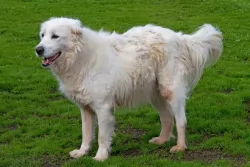 Abruzzenhund was established as an individual breed in the middle of the 20th century. They are descendant of the big, white Eastern sheepdogs which came to Europe 2000 years ago. Abruzzenhund is a mix of Turkish sheepdogs Akbash and Karabash, the Kuvac, Slovakian breed Hungarian breed, Komondor, and a French sheepdog Pyrenean Mountain Dog. Those dogs were much bigger than today’s breed. Abruzzenhund is still not very popular breed, but it is very common in Great Britain and Italy. They have been used as guard dogs, hunting dogs, and working dogs because they are very brave and strong.
Abruzzenhund was established as an individual breed in the middle of the 20th century. They are descendant of the big, white Eastern sheepdogs which came to Europe 2000 years ago. Abruzzenhund is a mix of Turkish sheepdogs Akbash and Karabash, the Kuvac, Slovakian breed Hungarian breed, Komondor, and a French sheepdog Pyrenean Mountain Dog. Those dogs were much bigger than today’s breed. Abruzzenhund is still not very popular breed, but it is very common in Great Britain and Italy. They have been used as guard dogs, hunting dogs, and working dogs because they are very brave and strong.
 This is a medium sized, muscled, strong dog with an iron-grey coat that has shades of deeper grey. His beautiful coat is long, thick and fairly harsh to the touch, with the undercoat protecting the dog against cold weather.
This is a medium sized, muscled, strong dog with an iron-grey coat that has shades of deeper grey. His beautiful coat is long, thick and fairly harsh to the touch, with the undercoat protecting the dog against cold weather.
Around the neck area the hair is longer, forming an eye-catching-like mane. The stomach area has longer hair too. He has a noble look about him with kind, brown eyes and a round skull. The muzzle of the dog is dark, the limbs long and muscular and the tail is long and covered in thick fur.
The dog is slightly longer than its height, and both males and females stand at 54 to 63cm in height and weigh between 26 and 40kg. The long tail reaches right down to the hocks. The ears of the dog are fairly short and are floppy.
This dog has always made an excellent guard dog, being alert and also being distrustful of strangers. He will need to be trained and socialized if you want him to be obedient to you and more amicable around children in the home as well as visitors to the home.
If he is trained and well socialized, he is able to make a good pet. However, he is an energetic dog, used to working and he isn't recommended for life in the city if there is only a tiny garden. He needs space and will require a large garden.
He will also need to be exercised and not just left to his own devices in the backyard. Because he is essentially a working dog he doesn’t easily fit into the role of pet and companion. He is a working dog and will need to be kept busy.
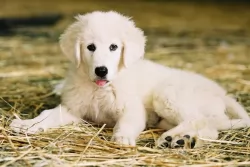 A height of Abruzzenhund variates between 60-73 cm, males are slightly bigger than females. While the weight is 30-45kg, again, males are heavier than females.
A height of Abruzzenhund variates between 60-73 cm, males are slightly bigger than females. While the weight is 30-45kg, again, males are heavier than females.
Abruzzenhund lifespan is between 11-13 years, but since these dogs don’t have any weaknesses and don’t tend to get sick, they can live longer with a proper care and adequate food and training.
Litter size of Abruzzenhund depends, but as any large breed, they usually have 6-9 puppies. And that is a very good considering size of the breed.
Abruzzenhund is not the only name of this breed. There are more names that you might hear. You can hear names like Maremma, Pastore, Abruzzese, Cane da Pastore, Maremmano- Abruzzese, Italian Sheepdog, and many similar names. Basically, they sound similar but there are differences.
Abruzzenhund is a friendly dog, but it is very powerful. Very strong jaw with a scissors bite makes them very strong. They have small but intelligent eyes, usually dark colored. The undercoat is dense, while the coat is white with segments of ivory to white yellow. Their long undercoat and coat make them winter resistant.
 Your Istrian Sheepdog is a unique, strong-willed dog that is used to guarding, and working and he wants to be kept involved and busy.
Your Istrian Sheepdog is a unique, strong-willed dog that is used to guarding, and working and he wants to be kept involved and busy.
He is wary of strangers and makes an excellent guard dog for any family home. Remember that it is never good to invest in a dog purely for guard dog purposes. A dog such as the Istrian Sheepdog is a social creature and he also wants- and needs to be part of a human family that provides him with plenty of interaction with them.
The Istrian Sheepdog is a loyal, loving dog who is capable of forming strong bonds with his human family. With proper training and socialization he makes a good friend of children and the elderly too.
Include him in all your family activities just like any human family member and he will make you a splendid, courageous pet.
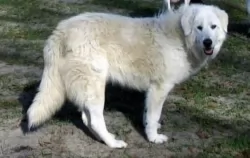 Abruzzenhund is a very well-balanced breed who loves spending time with other animals and people. They have a very good temper. They love being around families, and they are very gentle with children. It is important to train Abruzzenhund properly because the dog of that size should be a leader. A human with a strong character should train this breed. Training is important because they tend to make their own decisions which can be bad sometimes.
Abruzzenhund is a very well-balanced breed who loves spending time with other animals and people. They have a very good temper. They love being around families, and they are very gentle with children. It is important to train Abruzzenhund properly because the dog of that size should be a leader. A human with a strong character should train this breed. Training is important because they tend to make their own decisions which can be bad sometimes.
 As with many other dog breeds, the Istrian Sheepdog is a healthy dog that, because of history of hard work, is robust and able to stand up well to common dog illnesses.
As with many other dog breeds, the Istrian Sheepdog is a healthy dog that, because of history of hard work, is robust and able to stand up well to common dog illnesses.
However there is one dog illness that strikes many dogs and at any age, and it is hip dysplasia. This is a malformation of the hip joints.
You'll notice that your once active dog is lethargic, doesn't want to play so much anymore and battles to get up after lying down. The disease is painful for your dog and it can lead to mobility issues. The disease is diagnosed with x-rays and your vet will recommend treatment options to make life more comfortable and less painful for your beloved pet.
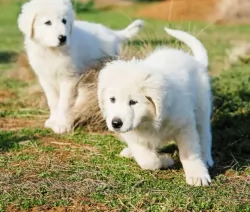 A great thing about Abruzzenhund is that they are very healthy dogs. They don’t have any chronical health problems, so if you are feeding your dog properly, with a lot of exercises they will not have any health problems. It is also important to check genetics of the dog.
A great thing about Abruzzenhund is that they are very healthy dogs. They don’t have any chronical health problems, so if you are feeding your dog properly, with a lot of exercises they will not have any health problems. It is also important to check genetics of the dog.
 This is a dog that is used to guarding his flock and he will need to be in a home that has a fair sized garden. He can adapt to life in the city or to the countryside, but wherever he is, he will need sufficient exercise. Take him with you on your walks or hikes and give him some rope- and ball games.
This is a dog that is used to guarding his flock and he will need to be in a home that has a fair sized garden. He can adapt to life in the city or to the countryside, but wherever he is, he will need sufficient exercise. Take him with you on your walks or hikes and give him some rope- and ball games.
Wherever you live in the world, when the Winter winds howl and blow in icy rain or snow, a dog is at an increased risk of illness. You decided to have a dog in your home and it is your responsibility to care for him. Winter weather is downright unpleasant and dangerous for most pets.
Bring your pet in during such weather and provide him with a warm, dry sleeping space. During hot weather, make sure your pet has a cool, shady spot to lie down in, out of the boiling sun. Whatever weather you're experiencing, your pet should never ever be without a constant supply of fresh, cool water.
Provide him with excellent food that is full of vitamins and minerals to keep him healthy. Learn to know what human foods can be toxic for him and cause him digestive problems.
Your double coated Istrian Sheepdog will need a thorough brushing at least twice a week because of his dense, double coat. He does shed and isn't a hypoallergenic dog. His thick coat can tangle easily if it isn't properly brushed and maintained.
Clip his nails when and if they grow long. Other grooming aspects for this attractive dog require checking his ears for infection and also checking his teeth as dental disease can lead to a host of serious illnesses in your dog.
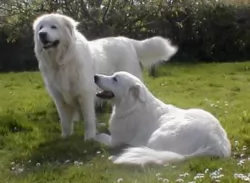 They learn very quickly, but it requires strong will and constant training to keep them happy. They are great working dogs, and with the positive training, they are amazing. It is very important that they follow rules and to keep them in balance with training.
They learn very quickly, but it requires strong will and constant training to keep them happy. They are great working dogs, and with the positive training, they are amazing. It is very important that they follow rules and to keep them in balance with training.
They can eat a lot of food, depend on their activity. High-Quality dog food twice a day for a grown dog is a must. While puppies should eat 3-5 times, smaller portions of food. The food is important especially for working dogs, they need up to 2000-3000Kcal per day. Abruzzenhund will enjoy eating meat with a lot of vegetables and oil.
They are not recommended for small house or apartment. They need big yard because they require a lot of space. During the winter they can be outside because of their coat, but during the summer they need to be in the shade with a lot of fresh water available anytime.
The coat should be brushed and groomed very often because they have a thick coat. There is a lot of dead and loose hair in it. During shedding, period takes even more time to groom your dog properly. They love and they need exercise. Mental exercise is important as physical. Every day walking, running, playing with other animals is an important part of dog's activity. When they get enough quality exercise, they will sleep in the house.